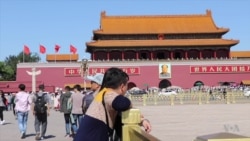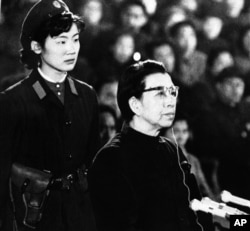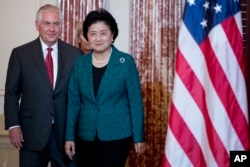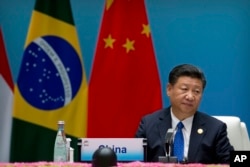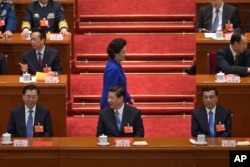In October, when China's Communist Party holds its once-every-five-years party congress and leadership reshuffle, many will be watching who Xi Jinping picks to fill top political positions.
But while the party congress is a time of high-stakes political drama for the party that single-handedly rules China, don’t expect women to be given any prominent roles.
In fact, observers say it remains largely impossible for women to have the final say in China’s political system, even though more and more Asian women in neighboring countries have been elected heads of state.
And the fact that women remain underrepresented in China’s major policy-making bodies is yet another example of how gender equality in China is all talk, no action, they add.
Unfit to rule
The lack of trust in women in power is hard to uproot in China as the general public often refers to the bad examples set by the three most powerful women in Chinese history -- Empresses Wu Zetian and Dowager Cixi as well as Jiang Qing, wife to late Mao Zedong , said Chenni Xu, a member of Beijing Women’s Network.
“They'll just point to those three and be like, ‘well, see what happens when women get in power, they drag the country down with them.’… It is just not encouraged,” Xu said.
“And people think that China has changed in equality just because women are in the workforce, but it is actually very unequal. In the home space, men aren't really invited into that space and people are still very much occupying traditional gender roles,” she added.
Female workforce
When Mao Zedong was China’s preeminent leader, he famously declared that “Women hold up half the sky”.
To this day, many remember the slogan.
But Xu noted Mao’s call was more about doubling the country’s workforce than gender equality.
Decades later, however, as women are filling more management positions in the private sector, China’s Communist Party is largely a men’s club.
Vice Premier Liu Yandong, 71, is one of a small handful at the top, but she is not a member of the top decision-making Politburo Standing Committee and is unlikely to move up in the upcoming reshuffle, analysts say.
Political underrepresentation persists
Women account for less than 30 percent of the Communist Party membership according to local media reports citing party statistics, and there will be about 540 female delegates among the 2,300 representatives who attend the 19th National People’s Congress.
Analysts say righting that imbalance is important if the Communist Party wants to remain relevant, but with its focus on big projects such as the “Belt and Road” initiative, the gender gap is not high on the party’s agenda.
“The only achievement in the past couple of years is China’s [first] national law against domestic violence. That says a lot about the government’s emphasis on women’s family role and a harmonious society. But it shows how little the government has done to address women’s issues” at home, said Yaya Chen of Shanghai Academy of Social Sciences.
Not on Xi’s agenda
On the contrary, President Xi has pledged $10 million to U.N. Women, helping other developing countries to close the gender gap by building 100 health projects for women and children.
“The government talks about boosting women’s political participation, but there haven’t been any concrete measures to support the initiatives,” she added, calling on the government to guarantee 30 percent of political appointments for women.
Xu of the Beijing Women’s Network agreed with the 30 percent quota, saying Chinese women should be empowered and the society’s systemic barriers to treat women as secondary citizens must be removed.
“Women's issues are like the canary in the coal mine. Once you have gender equality out there you can address every single kind of other progressive issues," such as lesbian, gay, bisexual and transgender rights, she said.
But she doubts that change will come easy, “because Chinese society is still helping him (Xi Jinping) kind of preserve this traditional gender roles. So, nothing is going to happen because you (women) have your family, everyone telling you to go through the usual routes, marriage, child bearing, etc...”
Change not easy
On the streets in Beijing, residents say social and cultural obstacles, as well as the big role that women bear at home, are to blame.
“There are a lot of women in civil service positions at the local level, but it is difficult for them to work their way up to higher positions because they don’t have as much time as men,” a man named Li told VOA.
In China, the retirement age for women is 55, five years younger than what it is for men, and a key reason for that is so women can take care of the elderly and their grandchildren.
Some women VOA spoke to say they pay no attention to politics. Others say politics is just too dirty, tricky and chaotic – clear signs of decreasing political interest among Chinese women.
“Women seem to be less interested in politics. These days, women are much more apolitical than they were before the 1980s, [years after] when Chairman Mao stressed that ‘Women hold up half the sky,” said a woman who identified herself as Ms. Su.
Some argue that women’s interests are looked after, even though they may not hold as many top posts or be larger in number.
Others are like one woman who spoke with VOA anonymously, who said she’s not interested in politics because it doesn’t speak to her or offer her anything of real value or enrich her life.




